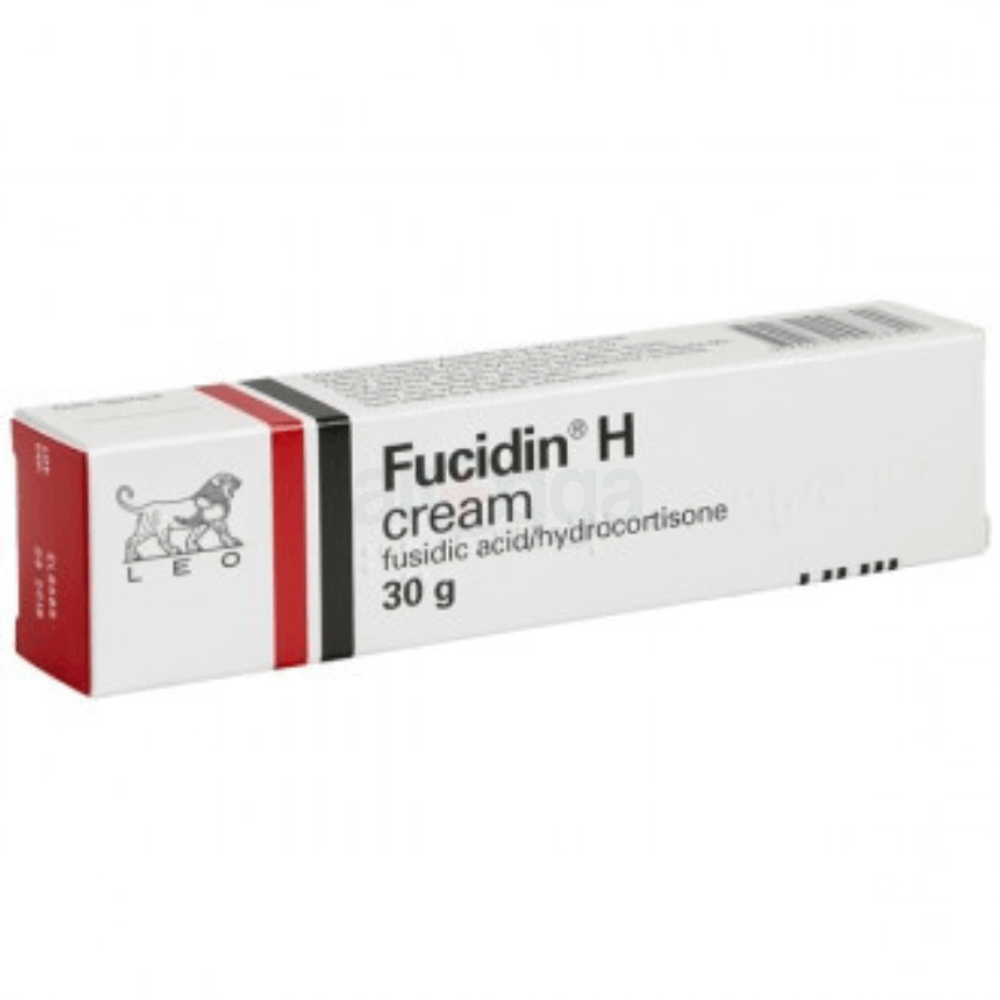

Out of stock
ব্যবসার জন্য পাইকারি দামে পণ্য কিনতে রেজিস্টেশন করুন
Register
0 People recently viewed this
Fucidin-H
Leo Pharmaceutical Products, Denmark
Generic: Fucidic Acid + Betamethasone Topical
Safety Advices
বাংলা
English
CONSULT YOUR DOCTOR
Fucidin-H may be unsafe to use during pregnancy. Although there are limited studies in humans, animal studies have shown harmful effects on the developing baby. Your doctor will weigh the benefits and any potential risks before prescribing it to you. Please consult your doctor.
CONSULT YOUR DOCTOR
Information regarding the use of Fucidin-H during breastfeeding is not available. Please consult your doctor.
Medicine Overview of Fucidin-H 30gm Cream
Introduction
Fucidin-H is a combination medicine that is used to treat various types of skin infections. It minimizes symptoms of inflammation such as redness, swelling, and itching. It also has antimicrobial action against infection-causing microorganisms. Fucidin-H is only meant for external use and should be used as advised by your doctor. A thin layer of the medicine should be applied only to the affected areas of the skin with clean and dry hands. If it gets into your eyes, nose, mouth, or vagina rinse with water. It may take several days to weeks for your symptoms to improve, but you should...
... Show moreUses of Fucidin-H
- Skin infections
Side effects of Fucidin-H
Common
- Application site reactions (burning, irritation, itching and redness)
How to use Fucidin-H
This medicine is for external use only. Use it in the dose and duration as advised by your doctor. Check the label for directions before use. Clean and dry the affected area and apply the cream. Wash your hands after applying, unless hands are the affected area.
How Fucidin-H works
Fucidin-H is a combination of two medicines: Betamethasone and Fusidic Acid, which treats skin infections. Betamethasone is a steroid medicine. It blocks the production of certain chemical messengers (prostaglandins) that make the skin red, swollen and itchy. Fusidic Acid is an antibiotic. It stops bacterial growth by preventing the synthesis of essential proteins required by the bacteria to carry out vital functions.
Quick Tips
- Fucidin-H helps treat inflammatory skin conditions such as eczema and dermatitis that are also infected by bacteria.
- It may cause minor burning, stinging, or irritation when applied. Inform your doctor if this does not go away.
- Avoid contact with your eyes, nose or mouth. Rinse it off with water if you accidentally get the cream in these areas.
- Do not cover the area being treated with airtight dressings such as bandages unless directed by a doctor, as this may increase the risk of side effects.
- Consult your doctor if your skin condition has not improved after two weeks of treatment.
- Do not use it for longer than prescribed as prolonged or repeated use can cause the skin to become over-sensitive to the medicine and may also result in the bacteria becoming resistant to the antibiotic.
Brief Description
Indication
Corticosteriod-responsive dermatoses w/ secondary infection
Adult Dose
Topical/Cutaneous
Corticosteriod-responsive dermatoses with secondary infection
Adult: Apply to the affected area(s) bid. Max duration: 2 wk.
Contraindication
Skin lesions of viral, fungal or bacterial origin, acne rosacea and perioral dermatitis.
Mode of Action
Betamethasone valerate is a topical corticosteroid that is effective in inflammatory dermatoses.
Topical fusidic acid is effective against Staphyloccus aureus, Streptococci, Corynebacteria, Neisseria and some Clostridia and bacteroides. Antibacterial activity of fusidic acid is not reduced when used with betamethasone.
Precaution
Avoid prolonged continuous treatment especially in infants and children. Extended treatment may increase the risk of contact sensitisation and development of antibiotic resistance. Not to be used for >7 days if there is no clinical improvement. Increased risk of glaucoma if preparation enters the eye(s). Pregnancy and lactation.
Side Effect
Prolonged intensive treatment may cause local atrophic changes in the skin e.g. striae, thining and dilatation of superficial blood vessels. Dryness, itching, irritation, hypopigmentation, burning sensation at the site of application or miliaria.
Interaction
Fucidic Acid: Synergistic action with antistaphylococcal penicillin. Antagonism with ciprofloxacin.
Betamethasone : Increased hyperglycaemia and hypokalaemia with thiazide diuretics. Increased incidence of peptic ulcer or GI bleeding with concurrent NSAIDs admin. Response to anticoagulants altered. Dose of antidiabetics and antihypertensives needs to be increased. Decreases serum conc of salicylates and antimuscarinic agents.
Potentially Fatal: Reduced efficacy with concurrent use of carbamazepine, phenytoin, primidone, barbiturates and rifampicin. Enhanced effect in women taking oestrogens or oral contraceptives.
ব্যবসার জন্য পাইকারি দামে পণ্য কিনতে রেজিস্টেশন করুন
Register